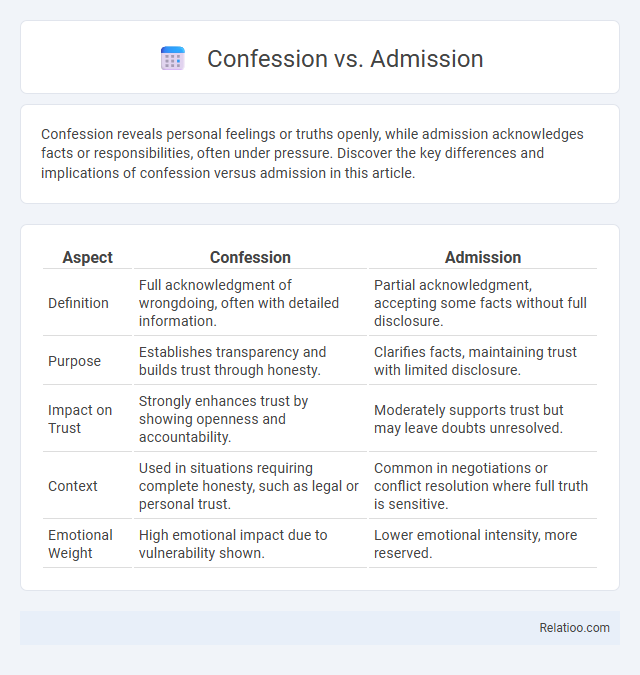Confession reveals personal feelings or truths openly, while admission acknowledges facts or responsibilities, often under pressure. Discover the key differences and implications of confession versus admission in this article.
Table of Comparison
| Aspect | Confession | Admission |
|---|---|---|
| Definition | Full acknowledgment of wrongdoing, often with detailed information. | Partial acknowledgment, accepting some facts without full disclosure. |
| Purpose | Establishes transparency and builds trust through honesty. | Clarifies facts, maintaining trust with limited disclosure. |
| Impact on Trust | Strongly enhances trust by showing openness and accountability. | Moderately supports trust but may leave doubts unresolved. |
| Context | Used in situations requiring complete honesty, such as legal or personal trust. | Common in negotiations or conflict resolution where full truth is sensitive. |
| Emotional Weight | High emotional impact due to vulnerability shown. | Lower emotional intensity, more reserved. |
Understanding Confession and Admission
Confession involves a detailed acknowledgment of guilt or wrongdoing, often including specific facts and circumstances surrounding the offense, making it a comprehensive disclosure. Admission refers to a partial acknowledgment of certain facts or involvement without fully conceding guilt or accepting all implications, serving as a less explicit acceptance than a confession. Understanding the distinction is critical in legal contexts where a confession can be used as strong evidence of culpability, while an admission might indicate involvement without a full guilty plea.
Semantic Differences Between Confession and Admission
Confession involves a voluntary acknowledgment of guilt or wrongdoing, often carrying a stronger implication of responsibility and remorse, whereas admission simply refers to acknowledging a fact or involvement without necessarily accepting full blame. In legal contexts, confessions are typically detailed and self-incriminating statements, while admissions can be partial or limited to specific facts without an overall guilt acknowledgment. Understanding the semantic difference is crucial for interpreting statements in judicial or interpersonal scenarios, as confessions hold more weight in establishing culpability.
Legal Definitions: Confession vs Admission
Confession and admission both involve acknowledging facts, but a confession is a full acknowledgment of guilt in a crime, often leading to a formal statement against one's own interest. Admission refers to a partial acknowledgment of some facts or involvement without a complete acceptance of guilt. Your understanding of legal definitions helps clarify that a confession carries stronger evidential weight in court compared to an admission, which might only support but not conclude guilt.
Implications in Criminal Law
Confession involves a voluntary acknowledgment of guilt, which can directly influence your criminal liability and strengthen the prosecution's case, while admission refers to conceding certain facts without explicitly accepting guilt, often impacting the evidence but not conclusively proving culpability. Both play critical roles in criminal proceedings, as a confession can lead to quicker resolutions and potential plea bargains, whereas admissions may require further corroboration to substantiate charges. Understanding these distinctions helps protect your rights and informs your defense strategy effectively.
Role in Civil Proceedings
Confession in civil proceedings serves as an unequivocal acknowledgment by a party of facts that adversely affect their case, directly influencing the court's decision. Admission, while also acknowledging certain facts, tends to be narrower, often relating to specific elements rather than the entire claim or defense. Your understanding of these distinctions is crucial for effectively navigating the evidentiary implications and strategic considerations in civil litigation.
Psychological Aspects of Confession and Admission
Confession and admission differ in psychological impact, as confession involves a voluntary acknowledgment of guilt or wrongdoing, often accompanied by emotional relief and a sense of catharsis, while admission may be a more factual acknowledgment without the deep emotional involvement. Your psychological state during a confession is typically marked by vulnerability, guilt processing, and a potential reduction in cognitive dissonance, which can lead to personal growth or therapeutic outcomes. Admission, in contrast, may be more detached and less emotional, serving primarily as a statement of facts rather than an emotional release.
Admissibility in Court: Key Considerations
Confessions, admissions, and statements differ significantly in legal contexts, especially regarding admissibility in court. A confession is an explicit acknowledgment of guilt, often requiring strict procedural safeguards to ensure voluntariness and reliability, while an admission is a less direct acknowledgment that can be partial or imply certain facts without full guilt acceptance. Your legal strategy must prioritize the distinction between these terms, as courts scrutinize confessions more rigorously due to their powerful impact on verdicts and the potential for coercion or misunderstanding.
Common Misconceptions
Common misconceptions often confuse confession, admission, and disclosure as interchangeable terms, but each holds distinct legal and psychological nuances. A confession is a full acknowledgment of guilt, sometimes used as definitive evidence in criminal cases, while an admission involves acknowledging certain facts without conceding guilt, and a disclosure may simply reveal information without implication of responsibility. Understanding these differences clarifies how Your statements might be interpreted in legal contexts and avoids unintended consequences.
Case Studies and Judicial Interpretations
Judicial interpretations distinguish between confession, admission, and statement, where a confession is an acknowledgment of guilt, often considered the strongest evidence in criminal cases, as seen in landmark rulings like *Miranda v. Arizona*. Admissions, while not full acknowledgments of guilt, can implicate involvement or facts and are frequently scrutinized for voluntariness and reliability, as demonstrated in *Harris v. New York*. Case studies illustrate how courts weigh the context, voluntariness, and corroborative evidence when evaluating confessions versus admissions to ensure fair adjudication and uphold defendants' rights.
Conclusion: Choosing the Correct Term
Choosing the correct term between confession, admission, and acknowledgment depends on the context and the degree of responsibility conveyed. Confession implies a full acceptance of guilt or wrongdoing, while admission often refers to acknowledging a fact without necessarily accepting blame. You should carefully evaluate the situation to ensure your language accurately reflects your intent and the level of accountability involved.

Infographic: Confession vs Admission
 relatioo.com
relatioo.com